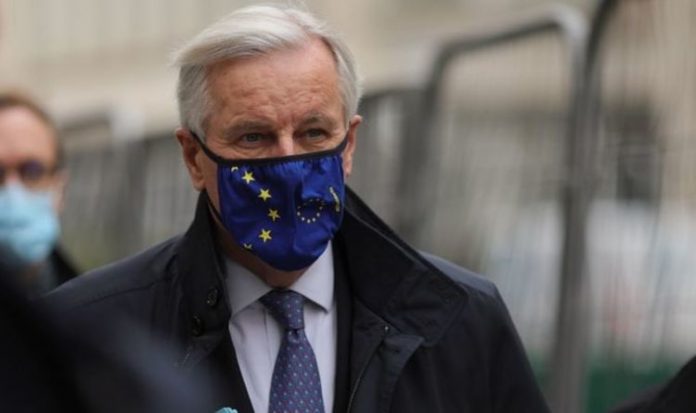With Brexit talks failing to come to a deal, Mr Barnier put forward a proposal whereby EU fleets would return 15 to 18 percent of all fish from British waters. This would mean the EU would still maintain close to 80 percent of fishing quotas as to what it has currently under the Common Fisheries Policy (CFP). The incredible demand has led Brexiteers to demand Boris Johnson quit trade talks immediately.
Former Brexit Party MEP for the West Midlands, Martin Daubney called on the UK to leave talks with a no deal Brexit following the demand.
Mr Daubney also expressed his concern the UK will now head towards a ‘Brexit in name only’ scenario.
He said on social media: “BRINO here we come?
“With the EU demanding climbdowns on fishing, surely it’s time to walk away from these ludicrous EU talks?”
In support of their former, colleague, fellow former MEPs, Ben Habib and Belinda de Lucy hit out at Brussels’ astonishing demand for our waters.
Ms de Lucy said: “Just imagine if our UK Government had the same love and value for our UK fishing waters as the EU does!”
Mr Habib added: “I will give one thing to the EU, they do at least appreciate the value of our fishing waters.
“So many commentators in the UK don’t.
JUST IN: Brexit LIVE: EU gives in and offers to SLASH fishing quota
Under the CFP, EU member states are given equal access to the waters within the bloc’s exclusive economic zone.
However, with the UK having left the EU, the Prime Minister has vowed to retake our waters and govern access and quota levels.
The UK Government has also drawn up the Fisheries Bill in order to establish provisions relating to Britain’s waters.
The legislation received a Royal Assent on November 23 and is now enshrined in UK law.
Despite the UK’s rejection of the EU’s proposal, talks will resume in London this weekend, Brussels has confirmed.
Brussels is racing against the clock to agree any possible deal in order for it to then be ratified by the EU Parliament.
Due to its nature, it is expected the deal will need to be ratified by MEPs in the Parliament and national governments.







